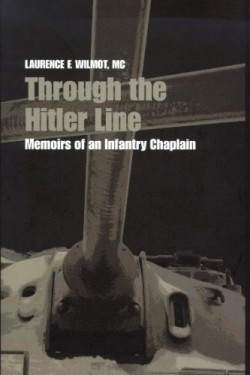
Through the Hitler Line
Memoirs of an Infantry Chaplain
“The enemy allowed our tanks to move into the open and then destroyed the whole squadron in a few minutes of heavy shelling,” writes the author, describing the first stage of the murderous battle for the Hitler Line that began on May 23, 1944, part of the Allies’ campaign against the German Army in Italy during World War II.
Wilmot had been ordained an Anglican chaplain in 1931 and served in a rural ministry in Manitoba, Canada. He joined the Chaplain Service at age thirty-five, and was assigned to the West Nova Scotia Regiment, part of the First Canadian Infantry Division, leaving his wife and three young children at home for almost two years.
Wilmot kept a journal during his service, enabling him to give a day-by-day account of the fighting and of his duties: he held religious services, buried the dead and forwarded their personal effects to the next of kin, made wooden crosses for their graves, bandaged soldiers who were slightly wounded, played the organ, led the singing of hymns, served as a battalion runner and as an unarmed stretcher-bearer, and counseled troubled soldiers. He also read the Bible each day and sometimes read the works of C.S. Lewis.
Describing his role as a stretcher-bearer, Wilmot recounts how soldiers lay on the ground, some dead, others in agony and screaming for help. Recalling his counseling work, he writes that “these men had been too long away from their families and their morale went to pieces on learning that their home lives had disintegrated.”
Surprisingly, the deeply religious Wilmot was not against drinking, and enjoyed the tot of rum that “each of us received to keep warm in our slit trenches.” He also tells of an amiable discussion he had with an atheist soldier.
During one encounter a shell hit his helmet, doing little damage, but leaving him deaf for a few days. Another time, a soldier walking with him was killed when he stepped on a mine; the explosion knocked Wilmot to the ground, but he was not injured.
He was awarded the Military Cross for his action in evacuating the wounded from a minefield during an intense fight. “The award could not have come at a more opportune time,” he writes, “for my spirits were particularly low and I was very near the point of physical exhaustion.”
Through the Hitler Line is the seventeenth in the university’s Books in the Life Writing Series. There’s a bit too much discussion about belief in God and the importance of prayer and meditation, but Wilmot offers a vivid account of this appalling carnage while modestly describing his part in aiding those in need.
Disclosure: This article is not an endorsement, but a review. The publisher of this book provided free copies of the book to have their book reviewed by a professional reviewer. No fee was paid by the publisher for this review. Foreword Reviews only recommends books that we love. Foreword Magazine, Inc. is disclosing this in accordance with the Federal Trade Commission’s 16 CFR, Part 255.
